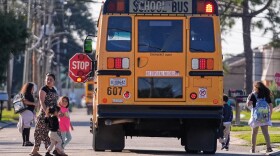
Aubri Juhasz
Editor, Education ReporterAubri Juhasz covers education, focusing on New Orleans' charter schools, school funding and other statewide issues. She also helps edit the station’s news coverage.
Previously, she was an education reporter for WHYY Public Radio in Philadelphia and hosted the station’s award-winning podcast Schooled. Before that, she covered education in New Orleans for WWNO.
A graduate of Barnard College, Juhasz got her start as a producer for NPR’s flagship news program, All Things Considered. She is from New York and lives in the Marigny. You can reach her at aubri@wwno.org.
-
Advocates for the law have long argued the point isn’t to hold kids back, but make sure they get the support they need to be ready for fourth grade.
-
With Carnival in full swing, the New Orleans culinary school gave its students a crash course — and a rite of passage — in baking their first king cake.
-
The case could reach the U.S. Supreme Court and reshape the role of religion in public education.
-
NOLA-PS board confirmed that it received the private donations promised to the school from community members on Monday (Jan. 12).
-
New Harmony High’s board of directors voted last month to surrender the school’s charter when it expires in June.
-
We learn about klezmer music from a local band, and some of New Orleans' most beloved musicians share their favorite Christmas songs.
-
The board was scheduled to vote on one of three options, including ceasing operations at the Leah Chase School at the end of the school year.
-
With New Orleans' school board set to decide the school's fate at its Thursday night meeting, parents and some members of the Chase family are asking the board to believe in the school.
-
The Southern Poverty Law Center of Louisiana and other advocacy groups are asking school leaders in the greater New Orleans and Baton Rouge areas to offer remote learning while federal agents are in the region.
-
Darwin was one of more than 5,200 students in Jefferson Parish who missed school after federal agents arrived in New Orleans on Dec. 3.











